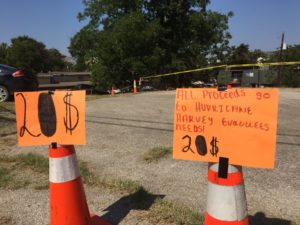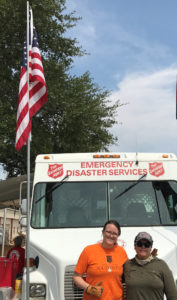
As natural disasters have occurred in our nation at an alarming pace over the past several weeks, students from Seminary of the Southwest have organized and deployed in efforts to provide physical, financial, spiritual and pastoral relief to those affected. Three weeks ago, with Hurricane Harvey still lingering over parts of Texas, student, administrative and faculty representatives met to discuss the best way to respond to such a massive need.
Almost immediately, student leaders identified Episcopal Relief and Development as an entity to support through fundraising. With University of Texas football games occurring in these weeks, students organized and sold parking spots on the nearby seminary campus, raising significant funds, with plans to continue this effort throughout the football season. Several thousands of dollars expect to be raised throughout the fall.
Reflected Dean Kittredge, “Watching the response from our student body to an overwhelming series of disasters has been inspiring. The scope of these events has been staggering, and for this community to organize and act so quickly displays courage and character among the future leaders of our church and counseling professions. We continue to pray for all those affected.”
 The student council has created a Disaster Relief subcommittee and named seminarian Lauren Kay (MDiv ’19) as the chair. The subcommittee will be working to coordinate planning of relief trips and centralizing information.
The student council has created a Disaster Relief subcommittee and named seminarian Lauren Kay (MDiv ’19) as the chair. The subcommittee will be working to coordinate planning of relief trips and centralizing information.This past Sunday, in coordination with Austin Police Department’s senior chaplain, Diploma in Anglican Studies student Denise Muller visited the evacuee shelter in Austin to deliver a service, but quickly realized their pastoral presence was most needed. Shared Muller, “(We) prepared a service, but once we arrived came to realize the people were not interested in a worship service there but desired a pastoral presence to listen to their stories and pray with them. I was grateful for the opportunity to serve in this unique context that in some ways mirrored hospital chaplaincy work.”
Originally motivated to act by the massive destruction caused by Hurricane Harvey which has devastated so many areas of the Diocese of Texas, as wild fires in the northwest grew, and Hurricane Irma wreaked havoc in the Carribean and southeastern United States, an effort to provide broader support has developed.

Said Kay, “Our disaster relief subcommittee is so named as not to forget those affected by other disasters. Initial conversations are happening about a potential Irma relief trip over spring break. While it is difficult to know how this might look in the long run, my hope is that, at the very least, this subcommittee will become a fixture on campus to keep people aware of what is happening, whether nearby or farther away. We cannot respond to every disaster, but several students here are in some way affected by, or connected to those affected by Harvey, Irma, and the wildfires burning in the Northwest. It is a key opportunity to ask what we can do, as seminarians, to respond in times such as these.”
This committee will also be organizing a blood drive in February, and will coordinate with local parishes and the Dioceses of Texas and West Texas to support already existing efforts.
Second year counseling student Christine Brunson recently travelled to La Grange, TX, to assist in recovery efforts, and is part of a task force convened at Episcopal Church of the Good Shepherd in Austin. That group plans to travel to Beaumont soon. Brunson emphasizes the long-term time frame of the recovery effort, as well the need to expand the scope out of Texas. “We have a group of seminarians who are looking towards more long-term efforts. As we move forward,” said Brunson, “I see SSW students gravitating toward involvement in recovery efforts in not only areas impacted by Harvey, but also those crippled by Irma. As students, we continually work to balance our responsibilities in the classroom, with our desire to be active in a hurting world. It can be a fine line to dance, but it’s part of our formation. It’s about constancy, not urgency.”

